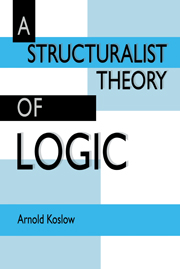Book contents
- Frontmatter
- Contents
- Preface
- Part I Background
- Part II Implication relations
- Part III The logical operators
- Part IV The modal operators
- 25 Introduction
- 26 Modality
- 27 Modals: Existence and nonextensionality
- 28 Special modals
- 29 The possibility of necessity-style modals
- 30 Modals revisited I
- 31 Quantification and modality
- 32 Modals revisited II
- 33 Knowledge, truth, and modality
- 34 The comparative strength of modals
- 35 Kripke-style systematization of the modals without possible worlds
- 36 Model functions, accessibility relations, and theories
- 37 Migrant modals
- Appendix A An implication relation for the integers in the programming language BASIC
- Appendix B Symmetric sequents as products of implication relations and their duals
- Appendix C Component-style logical operators and relevance
- Notes
- Bibliography
- Index
33 - Knowledge, truth, and modality
Published online by Cambridge University Press: 05 May 2010
- Frontmatter
- Contents
- Preface
- Part I Background
- Part II Implication relations
- Part III The logical operators
- Part IV The modal operators
- 25 Introduction
- 26 Modality
- 27 Modals: Existence and nonextensionality
- 28 Special modals
- 29 The possibility of necessity-style modals
- 30 Modals revisited I
- 31 Quantification and modality
- 32 Modals revisited II
- 33 Knowledge, truth, and modality
- 34 The comparative strength of modals
- 35 Kripke-style systematization of the modals without possible worlds
- 36 Model functions, accessibility relations, and theories
- 37 Migrant modals
- Appendix A An implication relation for the integers in the programming language BASIC
- Appendix B Symmetric sequents as products of implication relations and their duals
- Appendix C Component-style logical operators and relevance
- Notes
- Bibliography
- Index
Summary
We have been considering various kinds of operators, some familiar and some foreign, as examples of modal operators. We now wish to consider the possible modal character of the concepts of knowledge and truth, to take two central philosophical notions. Our aim is not to establish either that they have or that they fail to have modal character. Our purpose is to reinforce the idea that although many familiar concepts are modal on our account, the claim that a particular concept is modal can be a strong one that may not be consonant with what we believe to hold for those concepts. Knowledge and truth provide a case in point. The claim for their modality places some very strong constraints upon them. These requirements go beyond the simple matter of attending to certain formal analogies with necessity or possibility operators of familiar modal systems. That alone will not settle the matter of the modal character of a concept.
Knowledge
In the few passing remarks we made in Sections 25.1 and 28.3 concerning knowledge, we were concerned with eliciting the conditions under which the operator “K” [K(A): “It is known that A”] is modal. Whether or not these conditions hold is not at issue. Similar remarks hold for the truth operator “T” [T(A): “It is true that A”], which we shall study in the following section.
In order that K should count as a modal operator, we have to specify an implication structure I = 〈S, ⇒〉, where S is a set of statements (or whatever it is that one knows), and K maps S to S.
- Type
- Chapter
- Information
- A Structuralist Theory of Logic , pp. 327 - 339Publisher: Cambridge University PressPrint publication year: 1992



